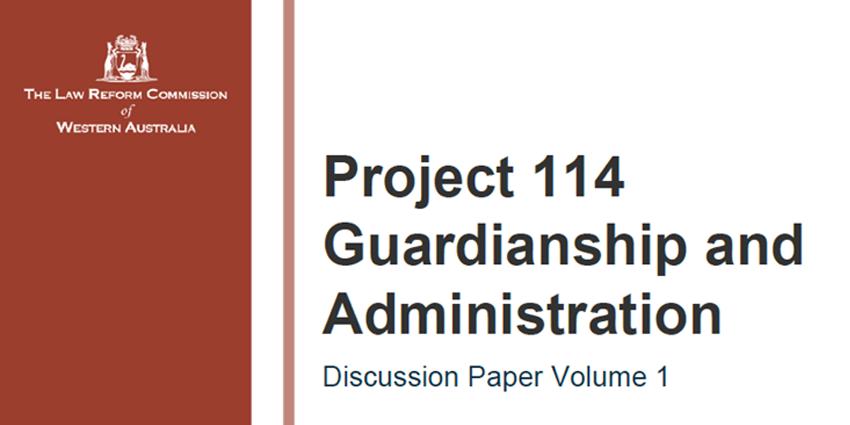
Overview
Due to the volume and complexity of this review the Commission decided to publish its Discussion Paper in two parts.
Discussion Paper Volume 1 (PDF, 1.5MB) canvasses various issues including whether Western Australia should adopt a supported decision-making model, the roles and responsibilities of guardians and administrators, the concept of capacity, and the statutory functions of the Public Advocate.
The Discussion Paper Volume 1 (PDF, 1.5MB) is divided into eleven Chapters and three Appendices as follows:
Chapter | Summary |
| Chapter 1 Introduction | Explains why the government has asked the Commission to review guardianship and administration laws and outlines the issues that the Commission will and will not be examining in this review. It also explains how you can tell the Commission your views. |
| Chapter 2 | Outlines the history of the Act. It also provides an overview of how the Act currently operates in relation to guardianship and administration; the two decision-making mechanisms which are the focus of Volume 1 of the Discussion Paper. |
| Chapter 3 | Describes the current landscape in which the Act operates. It identifies some of the contemporary concepts and challenges which, in the Commission’s preliminary view, are some of the central considerations for the LRCWA review. |
| Chapter 4 | Proposes seven guiding principles for the LRCWA review. It explains how the research and ideas discussed Chapters 2 and 3 provide the background to the Commission’s proposed guiding principles. It also explains how the Commission proposes to use the guiding principles in the LRCWA review. |
| Chapter5 | Discusses the language in the Act. It identifies some broad themes related to the Act’s language, as well as some discrete issues related to specific terms used in the Act. |
| Chapter 6 | Interrogates the principles in s 4 of the Act and whether they should be changed or supplemented. It also considers whether the Act should contain a statement of objectives. |
| Chapter 7 | Focuses on the concept of decisional capacity, which is central to the Act. It discusses how the Act engages with this concept. It also identifies and explores the issues related to the assessment of decisional capacity. |
| Chapter 8 | Examines the decision-making standard in the Act, primarily as it applies to guardians and administrators. It also explores potential alternative decision-making standards. |
| Chapter 9 | Considers arguments for and against amending the Act to formally recognise supported decision-making. It discusses what would be involved in the Act formally recognising supported decision-making, including the people needed to provide this. |
| Chapter 10 | Discusses specific issues related to the Act’s two substitute decision-making mechanisms: guardianship and administration. It discusses the appointments and functions of guardians and administrators. It also explores issues related to the oversight of guardians and administrators. |
| Chapter 11 | Considers the role and functions of the Public Advocate. |
| Appendix A | Appendix A contains a list of preliminary submissions received by the Commission. |
| Appendix B | Appendix B contains a list of the legislation referred to in Volume 1. |
| Appendix C | Appendix C contains a list of all the questions the Commission has asked throughout the Discussion Paper Volume 1. |
Volume 2 will focus on three other decision-making mechanisms in the Act which are broadly known as enduring instruments; enduring powers of attorney and enduring powers of guardianship as well as advance health directives. A key difference between decision-makers under these instruments compared to guardians and administrators is that they are appointed by a person with decision-making capacity (the term employed by the relevant instrument) to make decisions for that person. Volume 2 will also discuss restrictive practices and the Act’s confidentiality requirements, as well as the State Administrative Tribunal’s legislative role. Volume 2 is planned for publication in the first quarter of 2025.
Discussion Paper
Discussion Paper Volume 1 – Project 114: Guardianship and Administration (PDF, 1.5MB)
How do I make a submission?
The Commission is committed to meeting with individuals and organisations to listen to their stories. This will be in the first half of 2025 when the Commission will also visit regional and rural areas. In addition, there will be:
- Expert reference groups. The Commission aims to conduct 2-3 sessions with specific topics for discussion at each session.
- Sessions where individual service providers, community members and people with lived experience can share their unique experiences.
- An online survey and the option to upload written submissions on the Commission’s website.
For further information, send an email to the Law Reform Commission of Western Australia - lrcwa@justice.wa.gov.au, call 61 8 9264 1600 or visit the website.
Individuals and organisations can provide a written submission on one or more of the questions in Discussion Paper Volume One and/or Two. Submissions will close on Friday 16 May 2025.
A submission can be made as detailed below. There is no particular format you need to follow. You may, however, find it helpful to address one or more of the questions listed in the Discussion Paper.
After Discussion Paper volume 2 is published, the Commission will open a user-friendly online portal which will guide users through the questions in the Discussion Paper one by one and allow them to submit a tailored response to all or some of the questions.
Alternately, submissions can be made by:
- Email: lrcwa@justice.wa.gov.au
- Mail: Law Reform Commission GPO Box F317, PERTH WA 6841
Contact the Commission if you wish to receive the Discussion Paper or make a submission in an alternative format.
The closing date for submissions on Discussion Papers is Friday 16 May 2025.


